Your ideal solar cooker depends on your cooking needs and budget. For most home kitchens, a box-style cooker like the Solavore Sport ($287) offers the best balance of features, serving 6-8 people and maintaining temperatures up to 200°C for baking and roasting. If you're cooking for 1-2 people, consider the more affordable Sunflair Mini ($79.99). For high-temperature cooking like frying, a parabolic cooker reaches up to 371°C but costs more. All options help reduce your carbon footprint and energy bills while providing sustainable cooking solutions. Explore each type's unique features to find your perfect match.
Types of Solar Cookers Today
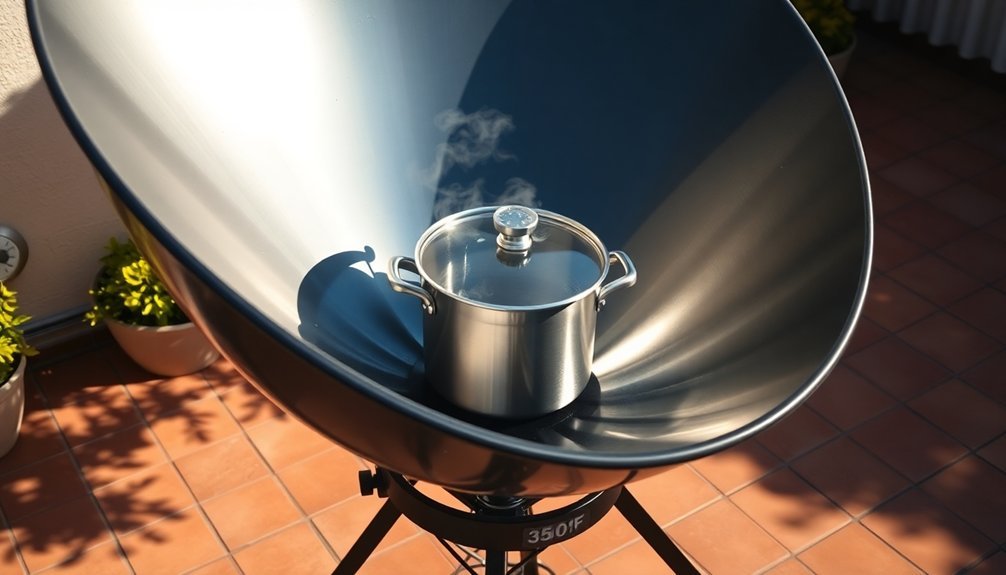
The world of solar cooking has evolved to offer four distinct types of cookers, each with unique advantages for different cooking needs.
Box cookers work like mini-greenhouses, using a glass lid and black interior to trap heat efficiently up to 200°C. These versatile cookers are slow-cooking alternatives to traditional electric appliances. They're perfect for baking and roasting.
Panel cookers use reflecting mirrors to concentrate sunlight onto your cooking pot, making them ideal for stewing and boiling at lower temperatures.
If you need high heat for frying or grilling, parabolic cookers deliver temperatures between 260°C and 371°C by focusing sunlight at a single point.
For quick, practical cooking, tube cookers offer thermos-like efficiency, reaching 280°C while keeping your food hot. Their double-glazed design lets you prepare meals for two in just 20 minutes.
Understanding Temperature and Cooking Times
Now that you're familiar with different solar cooker types, mastering temperature control and cooking times will help you get the most from your device.
Different models reach varying temperatures, from panel cookers at 65-150°C to high-performance parabolic units exceeding 290°C. You'll find cooking times are typically double that of conventional ovens, with peak performance between 10:00 and 2:00 on sunny days.
To maintain ideal cooking temperatures:
- Adjust reflectors to control heat intensity
- Reposition your cooker to follow the sun
- Use proper insulation and heat-absorbing materials
- Monitor temperatures with built-in thermometers
The SunChef solar oven offers impressive versatility, heating up in just 10 minutes and completing most dishes within an hour, while standard box cookers may need several hours for the same results. The advanced double-walled glass tubes help maintain consistent cooking temperatures even during cloudy conditions.
Budget and Meal Capacity
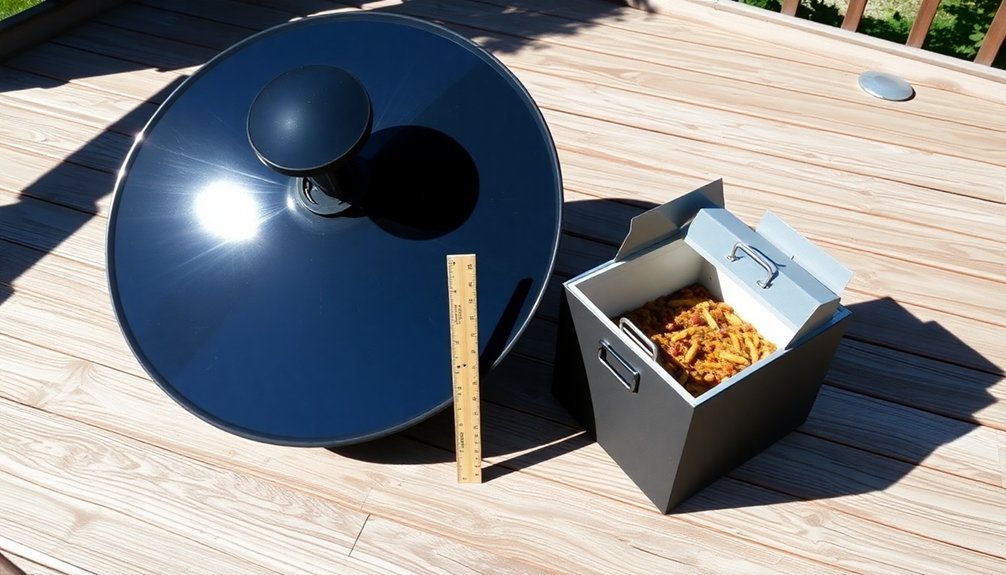
When choosing a solar cooker, striking the right balance between cost and capacity is essential for your specific needs.
For optimal sustainability, these cookers help create an eco-friendly kitchen environment while reducing your carbon footprint.
If you're cooking for a larger family, consider the Solavore Sport or Sunflair Deluxe, which can serve 6-8 people, though they differ greatly in price at $287 and $154.99 respectively.
For solo cooks or couples, the GoSun Sport ($279) and Sunflair Mini ($79.99) are designed for 1-2 people. The Sunflair Mini offers the most budget-friendly option for small-scale cooking.
If you're looking for versatility, the All Season Solar Cooker Camper provides ample cooking space with its 12" deep by 17" wide capacity, though it's priced at the higher end.
The Haines 2.0 Solar Cooker offers a budget-friendly alternative with modest capacity.
Durability and Storage Options
Beyond budget considerations, durability and storage features play a major role in selecting your ideal sun cooker.
Today's models use high-quality materials like recycled polypropylene, borosilicate glass, and stainless steel, ensuring long-lasting performance. Solar ovens that use proper heat retention materials can maintain cooking temperatures between 250-350°F.
When it comes to storage convenience, you'll want to take into account these key features:
- Tool-free assembly that takes just minutes
- Foldable design for compact storage
- Lightweight construction for easy transport
- Included carry bags or cases for protection
The SUNGOOD XL stands out with its ultra-slim folded dimensions of 34 x 26 x 3 cm and 5 kg weight, making it perfect for small spaces.
You'll appreciate its double-walled tubular collector and 12-month warranty, while the Sun Chef Cooker offers sturdy aluminum steel reflectors and movable legs for flexible storage options.
Weather Performance and Versatility
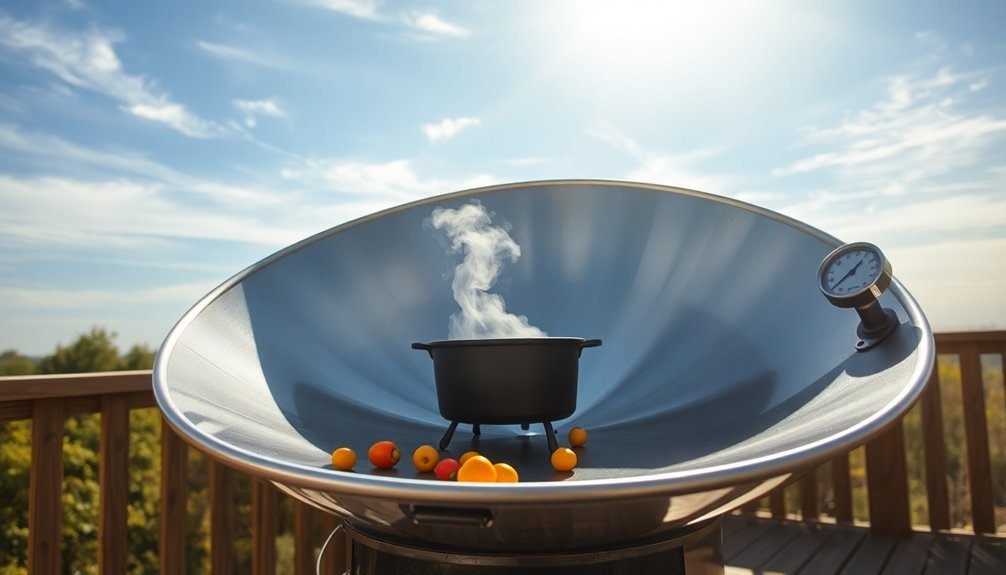
Since weather conditions can make or break your solar cooking experience, choosing a model with reliable all-weather performance is crucial.
The GoSun Fusion stands out by operating effectively in cloudy, freezing, windy, and dusty conditions, thanks to its vacuum tube insulation that retains heat for hours after sunset.
You'll appreciate the Fusion's hybrid functionality, allowing you to switch between solar and 12V power sources from cars, boats, or RVs. This versatility guarantees you can cook regardless of weather conditions.
The All Season Solar Cooker offers similar flexibility with its adjustable solar alignment system, enabling continuous cooking for up to 12 hours of daylight.
Both models utilize advanced technology like compound parabolic reflectors to capture light efficiently, making them five times more efficient than traditional ovens.
Frequently Asked Questions
Can I Use Regular Cookware With Solar Cookers?
You can use regular cookware in solar cookers, but it's not always ideal. You'll get better results with black-colored pots like enamelware or graniteware, which heat up faster than traditional pans.
Are Solar Cookers Safe Around Children and Pets?
Solar cookers can be safe if you follow proper precautions. Keep children and pets away from the cooking area, use oven mitts, and never leave it unattended. Always supervise and place it in a secure location.
Do Solar Cookers Affect the Taste of Food?
You'll notice solar cooking enhances food's natural flavors since it uses gentle heat and preserves moisture. You'll find your meals are more flavorful and tender, without any smoky taste or burned spots.
How Long Do Solar Cookers Typically Last Before Needing Replacement?
You'll get about 10-15 years from your solar cooker with proper maintenance. If you've invested in a high-quality box cooker and take good care of it, it could last more than 20 years.
Can Solar Cookers Be Used on Apartment Balconies or Rooftops?
You can use solar cookers on apartment balconies and rooftops if you have direct sunlight. Just make sure you've secured the cooker against wind and comply with your building's regulations and fire codes.
In Summary
When you're ready to choose your sun cooker, consider your cooking needs and local climate carefully. You'll want to balance cost against durability, and factor in your available storage space. Box-style cookers offer reliability for beginners, while parabolic models deliver higher temperatures for experienced users. Don't forget to check weather ratings and cooking capacity to guarantee you're getting the best solar cooker for your lifestyle.
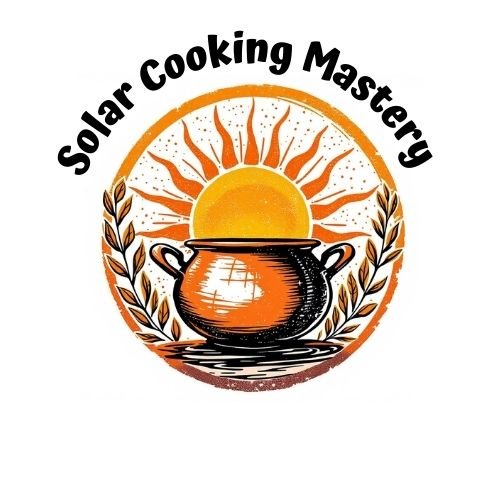
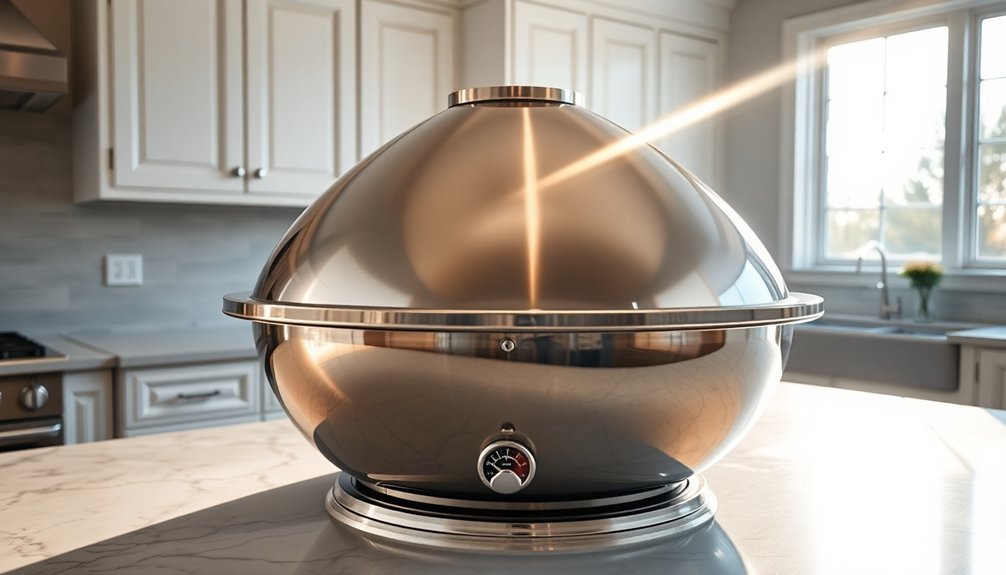
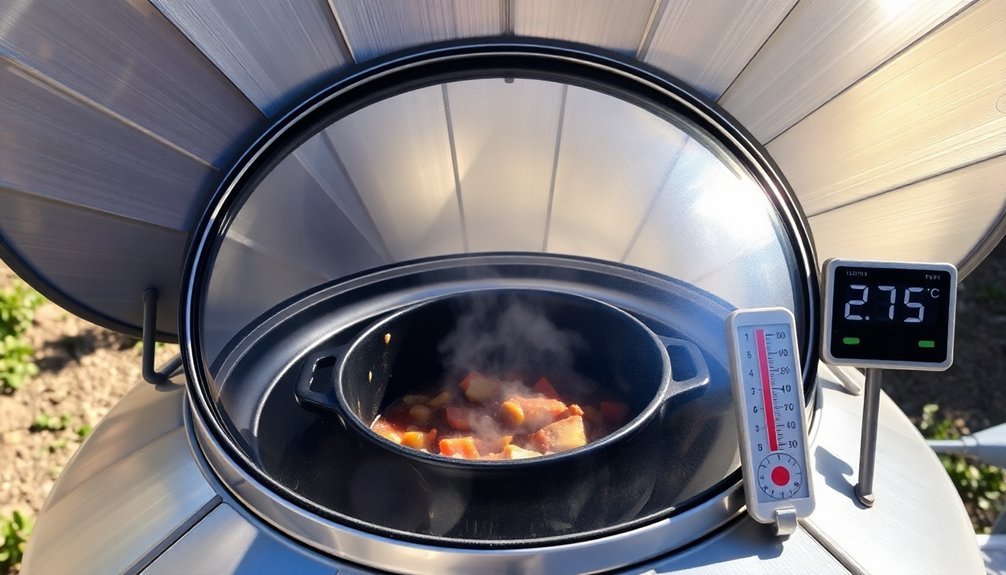
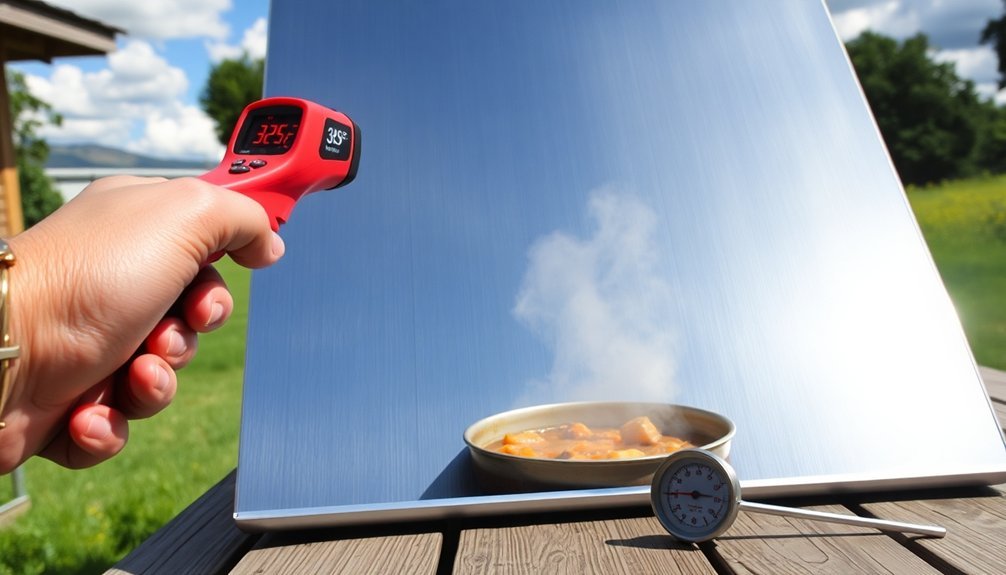
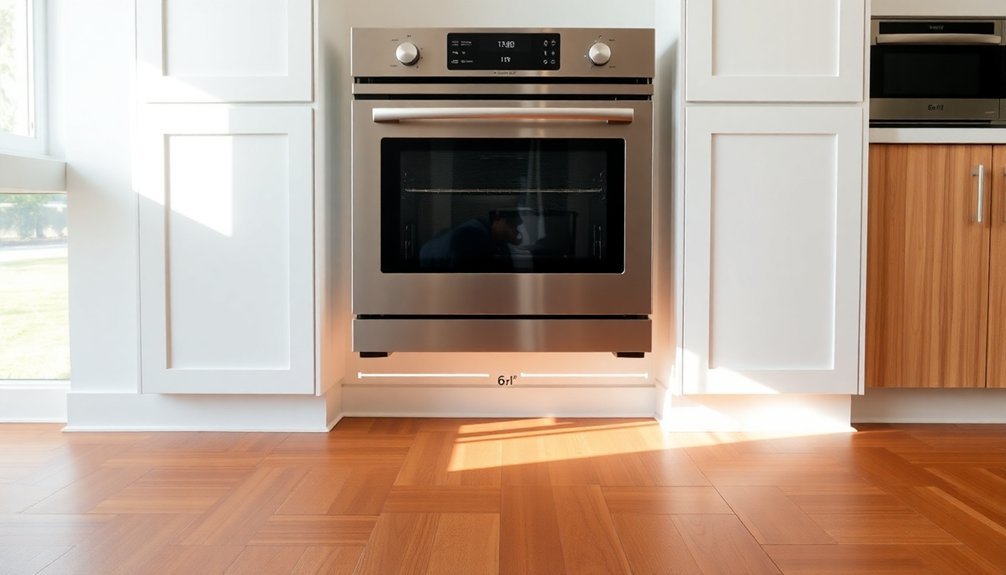
Leave a Reply